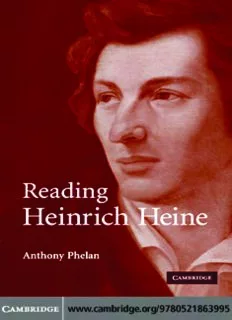
reading heinrich heine PDF
Preview reading heinrich heine
This page intentionally left blank READING HEINRICH HEINE This comprehensive study of the nineteenth-century German poet HeinrichHeineisthefirsttobepublishedinEnglishformanyyears. AnthonyPhelanexaminesthecompleterangeofHeine’swork,from the early poetry and ‘Pictures of Travel’ to the last poems, includ- ing personal polemic and journalism. Phelan provides original and detailed readings of Heine’s major poetry and throws new light on hisvirtuosopoliticalperformancesthathavetoooftenbeenneglected bycritics.ThroughhiscriticalrelationshipwithRomanticism,Heine confrontedtheproblemofmodernityinstartlinglyoriginalwaysthat stillspeaktotheconcernsofpostmodernreaders.Phelanhighlights the importance of Heine for the critical understanding of modern literature,andinparticulartheresponsestoHeine’sworkbyAdorno, Kraus and Benjamin. Heine emerges as a figure of immense Euro- pean significance, whose writings now need to be seen as a major contributiontothearticulationofmodernity. anthony phelan isaFacultyLecturerinGermanatOxfordand FellowofKebleCollege. cambridge studies in german Generaleditors H.B.Nisbet,UniversityofCambridge MartinSwales,UniversityofLondon Advisoryeditor TheodoreJ.Ziolkowski,PrincetonUniversity Alsointheseries j. p. stern:TheDearPurchase:AThemeinGermanModernism sea´n allan:ThePlaysofHeinrichvonKleist:IdealsandIllusions w. e. yates:TheatreinVienna:ACriticalHistory,1776–1995 michael minden:TheGerman‘Bildungsroman’IncestandInheritance todd kontje:Women,theNovel,andtheGermanNation1771–1871Domestic FictionintheFatherland stephen brockmann:LiteratureandGermanReunification judith ryan:Rilke,ModernismandPoeticTradition graham frankland:Freud’sLiteraryCulture ronald spiers:Brecht’sPoetryofPoliticalExile nicholas saul:PhilosophyandGermanLiterature,1700–1990 stephanie bird:WomenWritersandNationalIdentity:Bachmann, Duden,O¨zdamar matthew bell:TheGermanTraditionofPsychologyinLiterature andThought,1700–1840 ii READING HEINRICH HEINE ANTHONY PHELAN CAMBRIDGEUNIVERSITYPRESS Cambridge, New York, Melbourne, Madrid, Cape Town, Singapore, São Paulo Cambridge University Press The Edinburgh Building, Cambridge CB28RU, UK Published in the United States of America by Cambridge University Press, New York www.cambridge.org Information on this title: www.cambridge.org/9780521863995 © Anthony Phelan 2006 This publication is in copyright. Subject to statutory exception and to the provision of relevant collective licensing agreements, no reproduction of any part may take place without the written permission of Cambridge University Press. First published in print format 2006 ISBN-13 978-0-511-29455-6 eBook (EBL) ISBN-10 0-511-29455-7 eBook (EBL) ISBN-13 978-0-521-86399-5 hardback ISBN-10 0-521-86399-6 hardback Cambridge University Press has no responsibility for the persistence or accuracy of urls for external or third-party internet websites referred to in this publication, and does not guarantee that any content on such websites is, or will remain, accurate or appropriate. Contents Acknowledgements pagevii Introduction ix part i the biographical imperative 1 Thebiographicalimperative:KarlKraus 3 2 Thebiographicalimperative:TheodorAdorno 20 3 Thebiographicalimperative:HelmutHeißenbu¨ttel–pro domo 33 4 FromtheprivatelifeofEveryman:self-presentationand authenticityinBuchderLieder 46 5 Inthediplomaticsense:readingReisebilder 91 part ii the real heine 6 Howtobecomeasymbolist:Heineandtheanthologiesof StefanGeorgeandRudolfBorchardt 113 7 TherealHeine:AttaTrollandallegory 129 8 VentriloquisminLudwigBo¨rne.EineDenkschrift 151 part iii parisian writing 9 Scheherazade’ssnapshots:Lutetia 181 10 Mathilde’sinterruption:archetypesofmodernityin Heine’slaterpoetry 209 v vi Contents part iv epilogue 11 ThetribeofHarry:Heineandcontemporarypoetry 245 Notes 265 Bibliography 291 Index 303 Acknowledgements IstartedtoreadHeineundertheguidanceofTrevorJonesinCambridge, andthenfoundmyselfteachinghimattheUniversityofWarwick.Elisabeth Stoppencouragedsomeearlythinkingabouthisbearfable,AttaTroll;and IamgratefultotheGermanAcademicExchangeServiceforascholarship thatfirstenabledmetogettoknowthetextsofHeine’scriticalandcreative reception in the twentieth century, and to make a start on some of the secondary literature; and to the University of Warwick, the University of Oxford,andKebleandTrinityCollegesforresearchleave. Unlessotherwisestated,translationsaremyown.Iamparticularlygrate- fultotheSuhrkampVerlag,FrankfurtamMain,forpermissiontousethe EnglishversionofTheCompletePoemsofHeinrichHeinebyHalDraper. Chapter 10 on Romanzero and the later poetry appeared as a contribu- tion to A Companion to the Works of Heinrich Heine, ed. Roger F. Cook (Rochester, NY, and Woodbridge: Camden House, 2002). The Epilogue was first presented in Heine und die Weltliteratur, ed. T. J. Reed and Alexander Stillmark (Oxford: legenda, 2000). In each case I am grate- fultotheoriginaleditorsfortheirconstructivecriticism.Partsofthestudy were read by Helmut Schmitz and the late Gillian Rose at the University ofWarwick,andbyTomKuhninOxford;MartinSwaleshasalwaysbeen agreatsourceofencouragementovertheyears.Themanuscriptasawhole was read by Rowland Cotterill, Heidrun Friese, and Michael Perraudin. I am very grateful to all of them, and to a relatively anonymous American reader,fortheircriticalcomments,whichhavecorrectedmanyerrorsand clarifiedmuchthatwasobscure.SomethingsIpersistin–andthatisno one’sfaultbutmyown. WhatIowetoLizDowlerforherpatienceandpersistence,aswehead forananniversaryofourownoneyearafterthisHeineyear,ismorethan wordscantell. A.P. vii
Description: